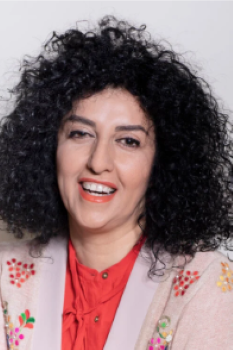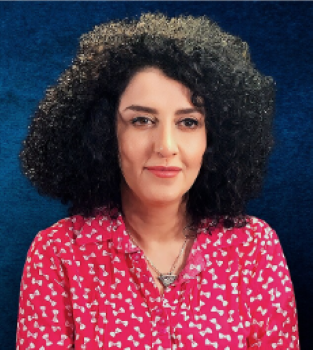
Narges Mohammadi was born on April 21st, 1972 in Zanjan, Iran. Her father, whose name is not publicly available, worked as a farmer and a cook. Her mother, Ozra Bazargan, whose occupation is unknown, hails from a political family. When Mohammadi was a child, members of her maternal family – her activist uncle and two cousins – were arrested following the successful 1979 Revolution, which led to the replacement of the Pahlavi dynasty with the Islamic Republic of Iran. In a 2023 interview with the New York Times, Mohammadi recalled two childhood memories that propelled her toward a career of activism: “her mother stuffing a red plastic shopping basket with fruit every week for prison visits with her brother, and her mother sitting on the floor near the television screen to hear the names of prisoners executed each day.” She recalled that one day, on the television, a newscaster announced the execution of her cousin. Her mother’s reaction left a mark on nine-year-old Mohammadi and influenced her long-held opposition to executions.
In the 1990s, Mohammadi enrolled at Qazvin International University to study nuclear physics with the hopes of becoming an engineer. At university, she looked forward to joining women’s student groups, but discovered that none existed. Undeterred, she founded her own student groups; among them was Tashakkol Daaneshjuyi Roshangaraan, which translates to Enlightened Student Group. While attending university, she also began writing articles supporting the Iranian women’s rights movement and promoting student activism. As a result of her outspoken commitment to the plight of Iranian women, state officials arrested her at two Tashakkol Daaneshjuyi Roshangaraan meetings. Reflecting her allegiance to the women’s rights movement, Mohammadi’s arrests did not discourage her from continuing her activism.
While at Qazvin International University, Mohammadi met her husband, Taghi Rahmani, at an underground class where he taught about the relationships between Islam and human rights, democracy, and civil society. At the time of their introduction, Rahmani was a seasoned political dissident, having served two prison sentences. Although her parents opposed the couple’s intention to marry—warning of the strain that their activism would put on the marriage—Rahmani and Mohammadi wed in 1999. Rahmani spent their first wedding anniversary in prison. On November 28, 2006, the couple welcomed twins, Ali and Kiana. After being arrested by the Islamic Republic five times, in 1981, 1986, 2001, 2003, and 2009 for his work with underground newspapers like Pishtazan and Movahed and his support of the women’s rights and free speech movements, Rahmani moved to Paris in 2011, where he lives in exile with his and Mohammadi’s children.

After graduating with a degree in nuclear physics, Mohammadi began working as an engineer. Meanwhile, she continued her activism by writing articles about women’s rights in various newspapers. She became involved with the Defenders of Human Rights Center (DHRC) – an organization that defends the rights of women and political prisoners – in 2003, the same year that its founder, Shirin Ebadi, won the Nobel Peace Prize. She would eventually become the vice president of the organization.
In 2008, the Islamic Republic of Iran forced Mohammadi’s employer to fire her because of her political activism. The government also banned her from leaving the country by confiscating her passport in 2009. Then, in 2010, after her ill daughter returned from a hospital trip, Mohammadi was arrested by the Iranian Ministry of Intelligence because of her work with the DHRC. She was subsequently placed in solitary confinement in Evin Prison—infamous for its human rights violations, which have been reported on by political prisoners and international human rights organizations alike. Although she posted bail, Mohammadi was convicted of “acting against the national security,” maintaining “membership of the DHRC,” and spreading “propaganda against the regime” in 2011. She was issued an 11-year cumulative sentence, which was later reduced to 6 six years on appeal. Mohammadi was released on bail in 2012 after her health condition deteriorated.
In 2014, after a speech criticizing Evin Prison’s treatment of prisoners gained traction on social media, Mohammadi faced charges of “spreading propaganda against the system,” “gathering and colluding to commit crimes against national security,” and holding “membership of an illegal organization whose aim is to harm national security.” She was arrested once more in 2015 and sentenced to 16 years in prison. When she attempted to appeal her sentence in 2016, Tehran’s Appeals Court upheld the lower court’s decision. A few months after her release in October 2020, Mohammadi returned to prison once again in November 2021 to serve out a sentence of 30 months, 80 lashes, and a fine for her activism. In 2022, an additional eight years and 70 lashes were added to her sentence.
In 2023, Mohammadi received the Nobel Peace Prize for her activism and opposition to Iran’s theocracy. In response, Iran condemned the Nobel Peace Conference’s decision as politically motivated by European and anti-Iranian sentiments. Unable to give an acceptance speech, Mohammadi wrote a letter addressing the conference, which was smuggled out of Iran and read out by her twins, Ali and Kiana, who accepted the prize in her stead. In the speech, Mohammadi denounced the Iranian “tyrannical” regime and declared that the prize would only strengthen her commitment to the women’s rights cause.

Mohammadi has authored a book called “White Torture,” which details the plight of imprisoned women in Iran. She has also published an essay collection: The Reforms, the Strategy, and the Tactics and has written numerous articles advocating for social reform in Iran, specifically the abolition of the death penalty and women’s rights. Furthermore, she was included in Time Magazine’s The 100 Most Influential People in 2024 list. Her tribute was written by Nadia Murad, an Iraqi human-rights activist and fellow Nobel Peace Prize laureate.
Since 2021, Mohammadi has been tried six times, and in January 2024, her sentence was extended by 15 months in jail and exile. According to Mohammadi, she is denied routine communication with her children, who fear they will never see their mother again. Most recently, in August 2024, Mohammadi was severely beaten by Evin Prison’s guards after she led a protest against the death penalty. Her requests for medical attention were denied.
For her contributions to the women’s rights movement, Mohammadi has been declared a feminist icon, and her sacrifices to the cause have been immense. Although she remains imprisoned, numerous international organizations have been advocating for her release, and there remains hope that, one day, she and all the women of Iran will be free.
Why Did I Choose to Research Narges Mohammadi?
Narges Mohammadi is a symbol of tireless persistence, and her career is proof of the indisputable necessity of the women’s rights movement. Believing in the legitimacy of women’s rights is a marvelous thing, but fighting for that belief is a difficult, and often costly, endeavor, especially in a country like Iran. The Islamic Republic of Iran is one of the most flagrant perpetrators of human rights violations masqueraded as acts of religious morality, and to oppose its regime can be deadly. Yet Mohammadi has criticized the government for over twenty years, and for her actions, she has been imprisoned and separated from her family. Her commitment to the idea that no one is free until everyone is free is both heartbreaking and awe-inspiring. I consider Narges Mohammadi a modern feminist icon, and I am eager to see the day that she and all the women in Iran are finally free.
Works Cited
Amnesty International. (2015, August 4). “Tearing my heart to pieces” – a mother’s story from prison in Iran. https://www.amnesty.org/en/latest/campaigns/2015/08/narges-mohammadi-tearing-my-heart-to-pieces-iran/
Fassihi, F. (2023, June 2). She Lost Her Career, Family, and Freedom. She’s Still Fighting to Change Iran. https://www.nytimes.com/2023/06/02/world/middleeast/narges-mohammadi-iran-political-prisoner.html
Fassihi, F. (2024, August 16). Iranian Nobel Laureate Badly Beaten in Prison, Her Lawyer and Family Say. https://www.nytimes.com/2024/08/16/world/middleeast/iran-narges-beaten-prison.html
Geneva Summit for Human Rights and Democracy. (2017). Taghi Rahmani. https://genevasummit.org/speaker/taghi-rahmani/
Guéron-Gabrielle, J. (2023, October 6). ‘My Heart Stopped’: Iranian Activist’s Family Exults From Afar, but Remains Fearful for Her. https://www.nytimes.com/2023/10/06/world/middleeast/narges-mohammadi-family-nobel-peace-prize.html
Kennedy, N. & Karadsheh, J. (2024, June 18). Iranian activist and Nobel Peace prize winner Narges Mohammadi sentenced to further year in prison. https://www.cnn.com/2024/06/18/middleeast/narges-mohammadi-extended-sentence-iran-intl/index.html
Najibullah, F. (2008, February 27). Iran: Activist 'Dynamic Duo' Fight for Human Rights. https://www.rferl.org/a/1079544.html
The Nobel Prize. Narges Mohammadi. https://www.nobelprize.org/prizes/peace/2023/mohammadi/statement/
Nobel Women’s Initiative. Meet Narges Mohammadi, Iran. https://nobelwomensinitiative.org/meet-narges-mohammadi-iran
Reporters Without Borders. (2016, January 20). Taghi Rahmani, Iran’s most frequently jailed journalist, arrested again. https://rsf.org/en/taghi-rahmani-iran-s-most-frequently-jailed-journalist-arrested-again
Simon & Schuster. Narges Mohammadi. https://www.simonandschuster.com/authors/Narges-Mohammadi/195913321
The Iran Primer. (2023, October 6). Nobel Prize: Writings of Narges Mohammadi. https://iranprimer.usip.org/index.php/blog/2023/oct/06/nobel-prize-writings-narges-mohammadi
Tom Lantos Human Rights Commission. Narges Mohammadi. https://humanrightscommission.house.gov/DFP/Countries/Iran/Narges-Mohammadi
This article was published on 11/4/2024